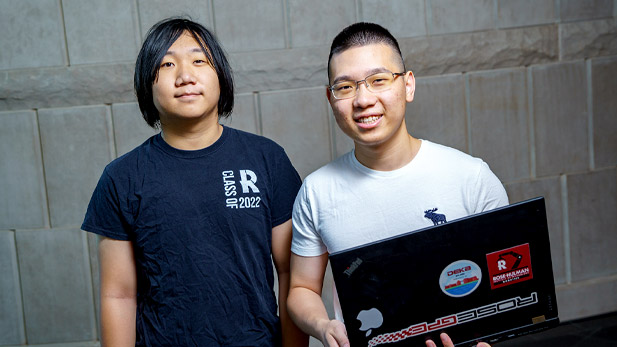Computer Science Duo Publish Four Joint Papers and Awarded Top Paper Honors at Prestigious NAACL Conference

Zeming (Eric) Chen and Qiyue (Bert) Gao, as two computer science majors and Class of 2022 graduates, were research partners in the field of artificial intelligence (AI) and natural language processing and co-authored four conference papers.
Zeming (Eric) Chen and Qiyue (Bert) Gao achieved, as undergraduate students at Rose-Hulman, something that is the envy of some graduate students. The two computer science majors and Class of 2022 graduates were research partners in the field of artificial intelligence (AI) and natural language processing (NLP) and co-authored four conference papers (with a fifth paper being submitted at the end of June). Chen wrote an additional conference paper for a total of five papers accepted.
Their most recent paper, “Curriculum: A Broad-Coverage Benchmark for Linguistic Phenomena in Natural Language Understanding,” was accepted for publication and presentation at the main track of the 2022 Annual Conference of the North American Chapter of the Association for Computational Linguistics (NAACL). It was also recommended for the best paper award at NAACL, which is considered a top-tier conference for natural language processing work. This is in addition to their paper, “Probing Linguistic Information for Logical Inference in Pre-trained Language Models,” which was presented at the 2022 Conference of the Association for the Advancement of AI (AAAI), another top-tier conference.
“AAAI is a Tier 1 conference,” says professor of computer science and software engineering Michael Wollowski, PhD. “The acceptance rate for this conference is 15%. Graduate and PhD students, and faculty, have a tough time getting in and they wrote that paper as juniors. They did not submit their papers to student conferences. They submitted them as any other career researcher would.”
The overall objective of Chen and Gao’s research is to help machines achieve similar cognitive abilities as humans. They are interested in understanding comprehension, reasoning skills and deductive logic in machine models.
In their most recent “Curriculum” paper, Chen and Gao developed a curriculum for machine models, much like learning curriculum for college students, that addresses the fundamental and advanced skills machines need to understand human language. Additionally, they developed a framework that allows researchers to closely monitor the learning quality of the models and identify potential weakness they may have.
“Finding problems in the current model is what the research community really cares about right now,” says Chen. “Many claim the models have superhuman performance. But the majority of the research community does not believe that. That’s why what we’re doing is interesting to that community.”
“What Eric and Bert are doing right now in natural language processing is huge and it is a very competitive field in AI,” says Wollowski.
Recently, a lead scientist for language at Microsoft Research posted a link to Chen and Gao’s paper on LinkedIn and complimented their work. The paper they are currently writing focuses on a concept called model interpretability. Currently, most AI models receive input, and the researcher is given a behavioral prediction. However, scientists do not know why it’s made that prediction. Chen and Gao are trying to create a method that understands the why; the thinking behind the choice the model made.
Chen and Gao, both originally from China, were drawn to how machines achieve cognitive abilities. The two students began collaborating to bring each other’s complimentary skills to the research. Chen’s strengths are in discovering problems and promoting novel ideas that are impactful to the research community. He is also strong in designing experiments that provide evaluation and analysis. Gao brings exceptional mathematics and logic to the work and is skilled at designing algorithms to solve problems.
“Originally, I was working on a topic that needed strong math proving and logic,” says Chen. “Bert is an expert in those things. We’ve found collaboration to be very beneficial. We get more ideas and perspectives on the problems while working together. And in research, you don’t want singular ideas and perspectives.”
After graduating from Rose-Hulman, Chen and Gao are off to work as research scientists in top AI labs. Chen secured a summer internship with the prestigious Institute of AI and Gao will collaborate with him on that project. In the fall, Chen will begin a PhD program at the Swiss Federal Institute of Technology in Lausanne. Gao will begin a master’s program.